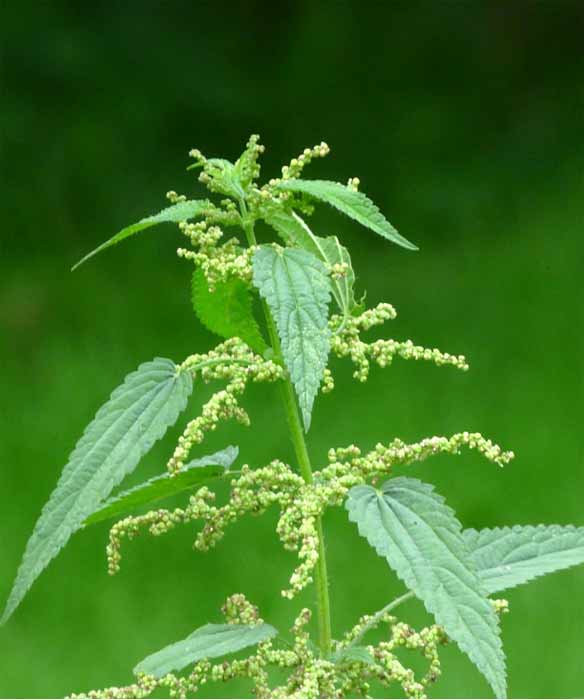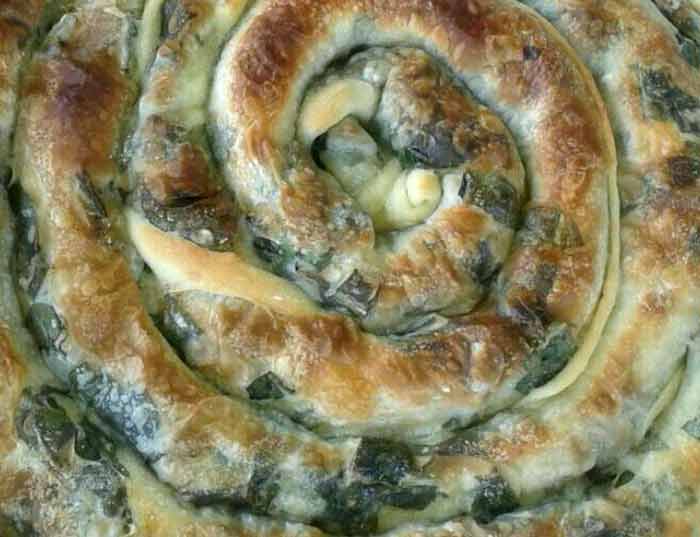Stinging nettle in herbal medicine
Stinging nettle (Urtica Dioica), also called stinging nettles or wild spinach, is a rich medicinal herb that drives toxins and metabolic waste products out of the body.

Nettle stimulates the kidneys to excrete more water and can help expel kidney stones.
Nettle is good for building the immune system.
The plant is also a tasty and nourishing vegetable if gathered when the leaves are young.
Stinging nettle root tea promotes prostate health. An extract of nettle leaves can help in the treatment of an enlarged prostate. Combine nettle with saw palmetto for best results.

Nettle helps heal the body.
Stinging nettles are an amazing medicinal herb.
- Nettle tea makes an excellent gargle for sore throat.
- Nettle is used to treat diarrhea, dysentery, and hemorrhoids.
- Nettle tea is a diuretic and astringent. It can stop nosebleeds, bleeding from wounds, and heavy menstrual flow.
- To stop a nosebleed, inhale powdered nettle leaves into the nose.
- Nettle helps sinus problems, allergies, and hay fever.
- Nettle is also used to lower blood sugar and is often prescribed for edema and heart conditions.
Nettle is rich in iron and vitamin C.
Nettle is rich in iron which makes it a good herb for treating anemia. It is also rich in vitamin C which prevents scurvy and helps the body to absorb iron.
Nettle plants take up large amounts of minerals from the soil. Read more about the benefits of vitamins and minerals here.
Nettle can be used in creams for the skin.
When applied externally, nettle sooths insect bites, stings, and burns. Nettle leaf infusions, creams, and ointments are used in the treatment of eczema and other skin conditions.
Stinging nettle is good for the hair and scalp.
A decoction of nettle root makes a good rinse for the hair and scalp. Use for falling hair, dandruff, and as a general conditioner.
Nettle is good for relieving painful joints.
Nettle leaves are anti-inflammatory. Nettle compresses are used for painful joints, gout, neuralgia, sprains, tendonitis, and arthritis.
Stinging nettle promotes milk flow.
American Indians used nettle for many things including coughs, colds, epilepsy, gout, stomach ache, insanity, and hair loss. It was also used to promote milk flow in nursing mothers.
Beware of stinging hairs when harvesting nettle.
The nettle plant has stinging hairs. When cooked, the hairs disappear.
When nettle comes in contact with the skin it causes an uncomfortable burning sensation. Always use gloves when handling fresh nettle. Nettle stings can be relieved by rubbing with dock, rosemary, mint, jewelweed, or sage leaves.

Science and stinging nettle
Nettle is effective when treating arthritis, rheumatism, and allergies.
The leaves are rich in fiber, minerals, vitamins, and antioxidants. Plus, they taste good when the top, tender leaves are cooked like spinach or other greens.
The plant is anti-inflammatory, antioxidant, analgesic, anti-infectious, hypotensive, and anti-ulcer.
Nettle tea reduces free radicals, reduces skin irritation, and can be used as an insecticide!
Stinging nettle is especially good for relieving cramping and bloating during menstruation. It also helps menopausal symptoms, can prevent excessive bleeding, and increases milk production in nursing mothers.
Scientists have found a multitude of health benefits in nettle including:
- reducing the risk of prostate cancer
- strengthening the bones
- treating respiratory problems
- helping in pregnancy
- improving blood circulation
- improving heart health
- improving gut health
- protecting from diabetes and helping control blood sugar levels
- boosting the immunity
- reducing inflammation
- preventing kidney stones
- detoxing the body
- improving female health
More about stinging nettle
Nettle is shown to have analgesic and antiviral properties.
Drinking nettle tea can help protect against urinary tract infections.
The name "nettle" is from the Anglo-Saxon "neodl" or needle. Its Latin name "urtica" means to burn.
Nettles have tiny hairs on the stems and leaves that cause burning and a temporary rash. These tiny hair, or trichomes, can pierce the skin and inject formic acid, the same chemical that is in bee stings.
Nettles are a rich source of polyphenols, which have been proven to protect against cancer, headache, rheumatism, some brain disorders, and some skin diseases.
One thing is clear, we all need to eat more stinging nettle!
Nettle history is long and varied.
Nettle has a long history of use. The Romans used nettle plants to flail themselves as a form of self-punishment and sometimes to keep warm.
Many cultures used the tough fibers to make rough cloth similar to flax and hemp.
Nettle is good for livestock and chickens.
Nettle has many uses on the farm. Dried and powdered, the leaves make a good chicken feed that increases egg-production and is healthy and fattening.
Nettle seeds give horses a sleek, shiny coat.
Harvest wild nettle in the spring and summer.
Harvest nettle leaves while flowering and gather the roots in the fall. Gather young shoots in spring for making a revitalizing tonic that cleans the lymphatic system.
Nettle plants
Nettle grows wild and can be found in pastures, meadows, and other sunny places.
The plant flowers from June to September.
Nettle plants usually grow to a height of 2 to 3 feet.
Its perennial roots are creeping, so it multiplies quickly. Wild nettle patches usually indicate that the soil is rich in nitrogen.
*Nettle may cause an allergic reaction in some individuals so take a small dose the first day. Always consult a physician before using any herbal remedy.
Sources:
https://www.ncbi.nlm.nih.gov/pmc/articles/PMC9253158/
https://www.ncbi.nlm.nih.gov/pmc/articles/PMC6100552/
Blessings to you and yours!
Thanks so much for reading my blog. Jan.

*Note - the information on this website has not been evaluated by the Food and Drug Administration.
© 2005-2024 website design and content by Janice Boling